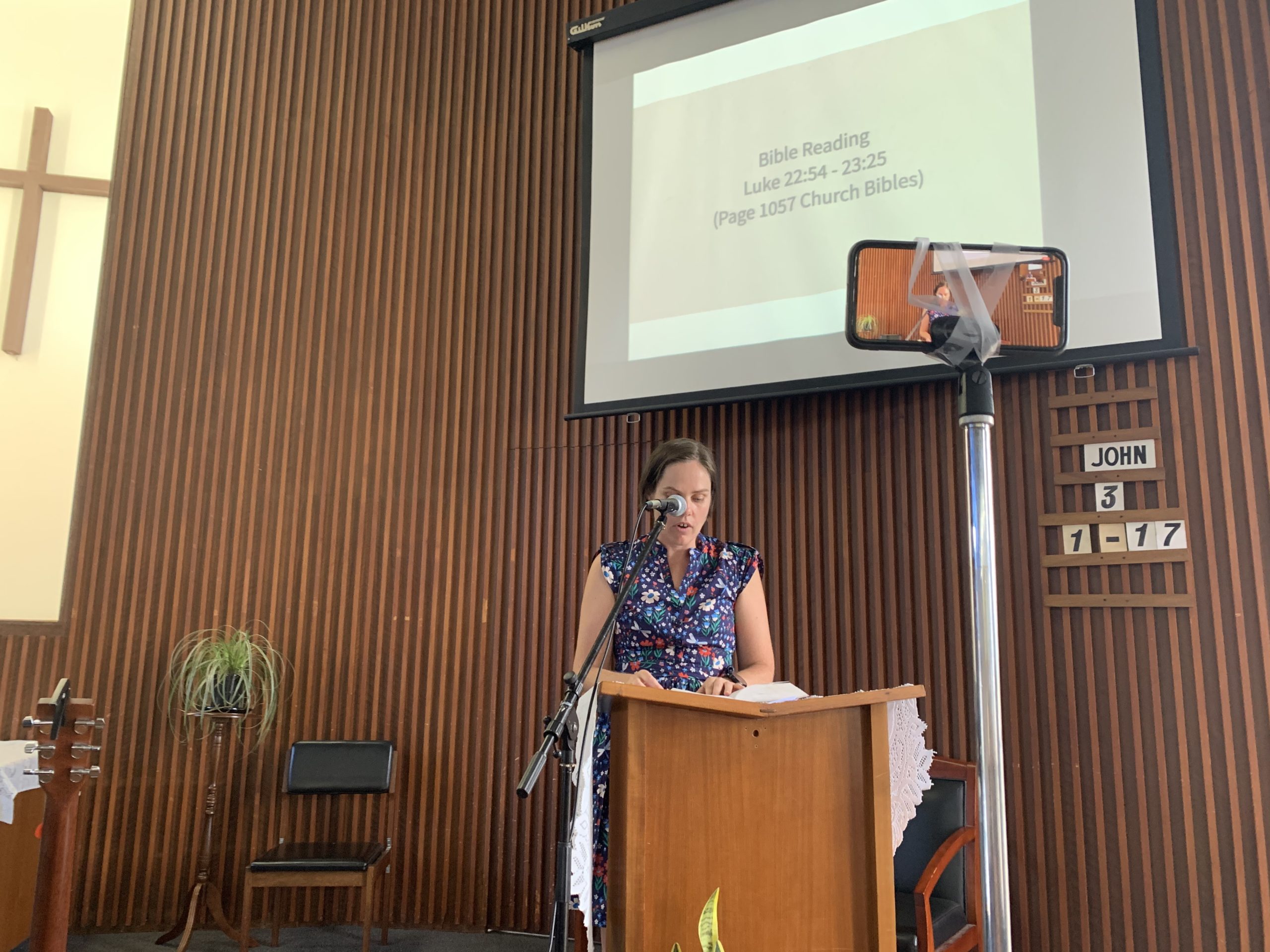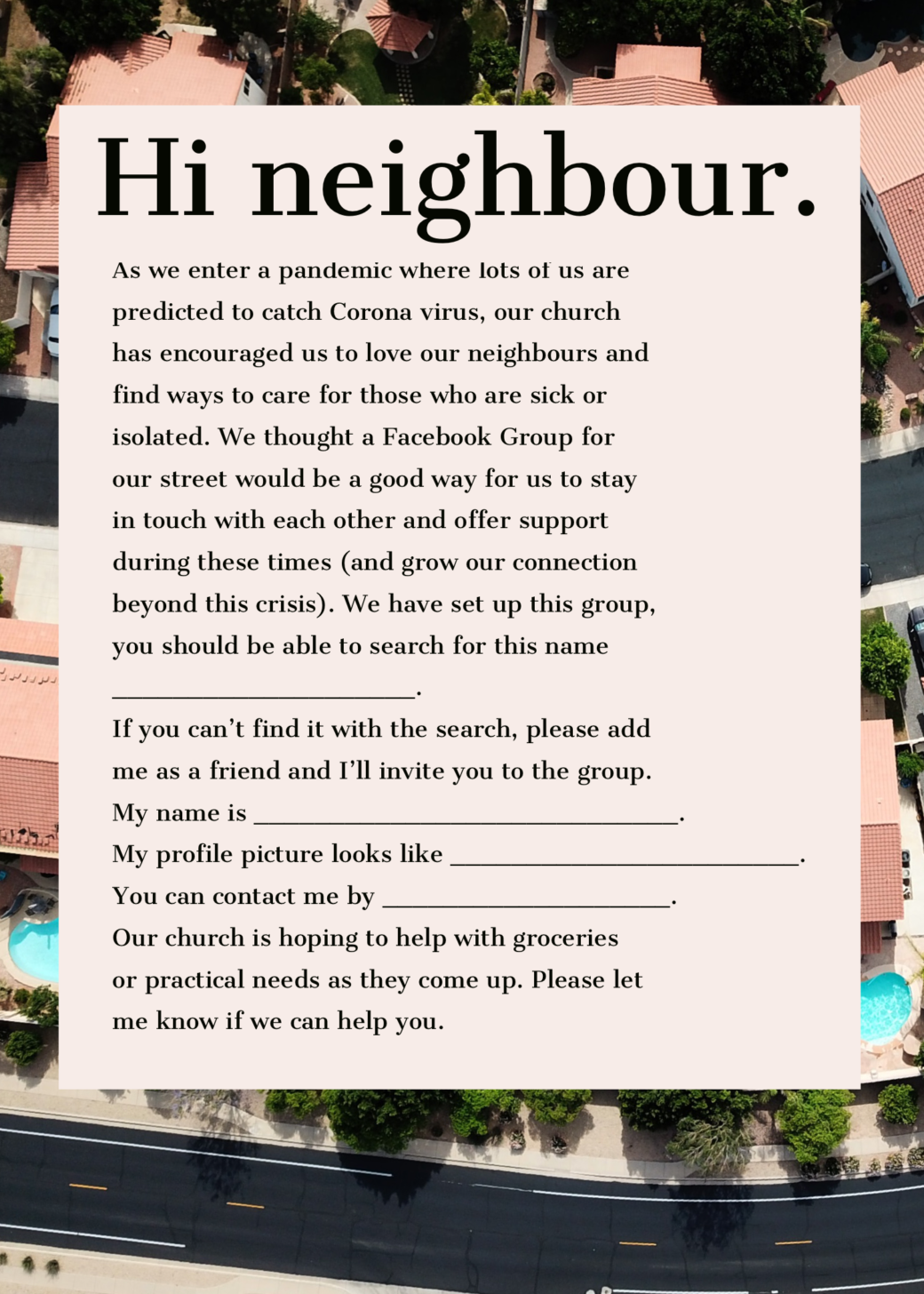There’ve been a bunch of stories circulating recently around church leadership — and especially around bullying uses of power and authority. Especially after Steve Timmis was stood down by Acts29 for abusive and controlling behaviours.
Team ministry is ridiculously hard. I’ve spent six years in a large staff team, not as the senior pastor, and with my boss leaving unexpectedly last year I’m not looking to have a new senior pastor in this season of life. This isn’t because I was bullied. I am familiar with other team ministry scenarios in our denomination and it seems there’s no easy model. I don’t think the problem is team ministry, or submission to a leader in that context. My experiences, and this desire to no longer have a boss isn’t the result of bullying, but I do think some of it is the result of a toxic approach to church that spreads way beyond our church and our denomination. This toxicity is the air modern pastors breathe (and the air, by extension, that modern congregations breathe).
I’ll suggest why below, and unpack some of my reflections. I have, as unpacked in some posts towards the end of the year, been developing certain convictions about church and leadership (and church size) as a result of my experiences in the challenging environment of a large team, a complex system, and the relational dynamics that come with both.
I’m not speaking about my experiences as though I can detach myself from the church environment I am part of; I have been involved in leadership and decision making as our church evolved and designed a complex system over some years in pursuit of the mission to make disciples in an increasingly post-church Australia. There are parts of this system that are expressions of what I’m going to suggest is toxic churchianity; the type of system where power games become possible based on results. My former senior pastor’s story is not mine to tell, it’s his, but I’m reasonably confident his reflections on the system have landed in similar places to mine. And so, not just because it’s best practice, but from my own experience, I want to be careful to charitably read the motivations of many people in ‘high authority’, complex, systems; these are often leaders who passionately want to see growth in God’s kingdom. Churches, especially those with a team of staff, do need organisation, and structures, and management, and very few of our leaders are trained to operate in those structures. The kinds of leaders who find themselves in large systems are typically exceptional in such a way that in a market driven, consumer, approach to church they are likely to build a platform; which includes growing churches beyond the size that a community is manageable.
In church planting literature around church size dynamics, famously a paper by Tim Keller, there’s a recognised transition point from ‘pastor sized church’ to ‘program sized’ at 150 people. 150 people is also a sociological barrier called ‘The Dunbar Number’ — an established sized for safe, relationally connected, community. Church growth leaders celebrate those who can redesign church systems, around redefining the role of the pastor/leader, in order to push past that barrier. Our consumer culture of church celebrates those leaders who achieve big growth for the sake of the kingdom. I’ve seen church leaders (plural) be disciplined by one organisation for toxic behaviour only to be embraced by another sister organisation because they get results (ie grow a church or ministry) and must be, therefore, faithful and competent ministers of the Gospel. That’s toxic; we’re not talking Vatican level problematic shuffling someone around within one system, but instead NRL level one team picking up a player after another team removed them for bad behaviour.
Most pastors are not trained to run the systems and teams required to operate a church bigger than 150, and none I know would list that as the passion or calling that drew them into ministry. Most love God as revealed in Jesus, love the Bible, and love people, and want to work in the intersection of those areas; few want to apply that love for people just to managing staff and leaders. The shift from ‘pastor size’ to ‘program size’ requires more control, influence, or authority to be excercised by the leader (at least in the literature, and in practice).
This isn’t to say abuse isn’t possible in pastor sized churches; our model of church typically assumes that is a stage the pastor must lead through, such that some of the leadership styles of later stages need to be adopted in order to get to those stages and make the transition less jarring. Pastors with personality disorders or authoritarian streaks are probably going to enact those personality types in smaller groups/churches too, just with a different group of people in their sphere; so Stephen McAlpine’s account of life in Timmis’ church (smaller than 150) was mirrored in the way Timmis allegedly acted in the Acts29 network. That said, I do think there’s something protective in the ‘killing of ambition’ necessary in committing to pastor-sized churches as a healthier norm. This alone won’t mitigate toxic churchianity, but when pursued alongside really good structures around accountability, and clear, cruciform, thinking about the role of the pastor or any leader in Christian relationships, such that leadership is about integrity, example, and influence rather than power and authority as understood by the world, it’ll address some of the issues.
Here’s a controversial thesis: a church actually sacrifices health and some of the fundamentals of church community in order to move from ‘pastor size’ to ‘program size’ in Keller’s model; and that sacrifice is echoed in the person of the leader unless there are really deliberate structures in place to mitigate that effect. A commitment to growth through all barriers, at all costs, under one leader, is toxic for both church and leader.
In cultures that celebrate and reward results (through influence and bums on seats), and systems that are geared towards results, there’s a corresponding pressure put on leaders to achieve results. I think an across the board move to pursuing church communities bigger than 150 in the name of mission, and measuring oneself against the ability to do this (and against those who have), we’ve fundamentally changed the nature of church and pastoring; and, in a documented way, we’ve started embracing worldly forms of leadership and authority in the church. When this process is healthy it’s about gleaning wisdom — God’s truth — about how systems and communities operate, but when it’s unhealthy, we’re plundering Egypt and building golden calves rather than golden decorations in the Tabernacle.
We don’t have a great (or consistently applied) paradigm for co-opting worldly truths, and this is especially true when we adopt worldly metrics for success (in the name of mission). This was what I wrote my thesis on at college; considering how Christians might adopt worldly wisdom around public relations and persuasive communication. And my answer was ‘cruciformity.’ We have to consider how the paradigm of a crucified king turns worldly wisdom on its head; while not rejecting it. I think this allowed Paul to learn from Roman orators, but respond to a church in a city obsessed with worldly metrics and style (Corinth), and allowed the compilers of the Book of Proverbs to graft in stacks of Egyptian wisdom, bracketed by reminders about ‘the fear of the Lord’ being ‘the beginning of wisdom.’ This is true both for how we approach wisdom about persuasion and communication from the business world; and how we approach wisdom about leadership.
The Church Growth Movement kicked off when missionary Donald McGavran returned from India to the U.S, realised it had become a mission-field (post-Christendom) and so sought to apply organising principles from the world of business to the world of church, where those activities and the forms/mediums/methods we adopt were unaffected by the Gospel, Christianity became just another product to sell (and buy), and the church became another business system. The senior pastor became CEO. This is an inevitability. Lots of senior pastors in team ministries in big churches have to operate like a CEO; the question then is how they should operate in that chair (cruciform wisdom), and how much we want to repeat that structure as the goal of church ministry (possibly not).
It’s possible to build big faithful systems with pastor as CEO, but it’s much harder than it looks (and we’re not well equipped to do it well). Too many Christian leaders, especially protestant evangelicals who have over-emphasised ‘sola scriptura’ are media illiterate; we’ve rejected ‘forms’ to be ‘word alone’ without realising that is a form; and we don’t notice all the other forms we embrace (like multi-purpose buildings or meeting in shared public space, rather than the architecture of a church building or home), or homogenous groupings within churches, or the management styles and structures we adopt in our teams. This is a problem because when our motivation is getting the content of the Gospel to as many people as possible, it’s that intention, rather than the content of the Gospel, that dictates the forms we adopt — whether forms of persuasion, or communication, or forms of leadership, or church structures. The church growth movement, which problematised the 150 barrier (see for example, this piece from a popular leadership blog), rather than seeing it as a natural limit, at its worst, established an uncritical embrace of business growth principles, which impacted our use of forms across the board. It’s important to recognise how this co-opting of business principles has impacted how we approach leadership and success, and how that then impacts how we use the content of the Bible to justify those forms; so, how Bible verses are then weaponised or sloganised (something particularly shocking in the Timmis revelations). It’s interesting to note the parallels between how Bible verses are used to justify abusive or bullying leadership in pursuit of the mission of the Gospel, and how domestic abusers are recorded weaponising the Bible to justify their behaviours (and how the Serpent twists God’s word in Genesis 3, and in the temptation of Jesus).
Cruciform patterns of team ministry are very difficult to reconcile with models of leadership that come from the world; those models that emphasise top down authority, vision, and control in pursuit of results/metrics that the leader is kept accountable for meeting. This pressure placed on leaders to secure results — this toxic culture — is to abuse in church, what toxic masculinity is to domestic abuse (and on this, read the bracing, but necessary See What You Made Me Do, a deep dive into domestic abuse by Jess Hill). It’s the air we breathe that has led us to sanctify a utilitarian approach to church.
The challenge is that the toxicity of the system we operate in actually rewards narcissists or people who operate with thoroughly worldly paradigms; which is why stories are starting to circulate about the disproportionate number of narcissists in Christian leadership; and I don’t just mean the narcissistic behaviour that is a product of a system that rewards results and requires a brash sort of leader, though that is bad, I mean that the system attracts those with the personality disorder in a documented way). The trick is that we need to distinguish between those who can’t manage teams well because that’s not what pastors are trained to do, but these are the ‘rules of the game,’ those who are playing that game according to the toxic conventions for the sake of the mission of the Gospel (to get bums on seats and souls into heaven — there’s an overlap here between an understanding of the Gospel as calling for conversion rather than discipleship and being part of the kingdom that is fundamental too), and those who are genuinely very dangerous and abusive narcissists. It won’t always be that easy to tell the difference, and perhaps this is why we need Chuck DeGroat’s upcoming book When Narcissism Comes To Church. The first chapter, available as an excerpt, is worth reading ahead of its release. This diagnosis alone makes me think the book should be essential reading by all church leadership teams – whether staff, or elders – to invite some self-reflection. I’d suggest those leaders who don’t want to subject themselves to this sort of scrutiny are raising a red flag… in the same way that church leadership teams or denominations might suggest mandatory psychological assessments of pastors and employees (which we’re doing around the results of the Royal Commission into Institutional Abuse of Children, so it wouldn’t be hard to add a test around narcissistic tendencies/coercive control/abuse) and it would be a red flag if a leader refused. Here are a few passages from the book:
“This sad abandonment of the humble way of Jesus shows up today in pastors of large and small churches, in beloved Christian celebrities, prolific clergy authors and bloggers, dynamic church planters, and seemingly godly men and women. The frightening reality of narcissism is that it often presents in a compelling package. Narcissism is the “glittering image” we present to the world…
When I started doing psychological assessments for pastors and church planters, I saw that narcissistic traits were often presented as strengths. Narcissism can be interpreted as confidence, strong leadership, clear vision, a thick skin. A colleague of mine often says that ministry is a magnet for a narcissistic personality—who else would want to speak on behalf of God every week? While the vast majority of people struggle with public speaking, not only do pastors do it regularly, but they do it with “divine authority.” In my own work, which includes fifteen years of psychological testing among pastors, the vast majority of ministerial candidates test on the spectrum of Cluster B DSM-V personality disorders, which feature narcissistic traits most prominently (as we’ll see in the next chapter). The rates are even higher among church planters…
For centuries, ecclesial systems have been structured hierarchically, privileging particular people over others. Male leaders, the educated, people with resources, or the well-connected traditionally have greater access to power than others. Structures are not necessarily to blame for narcissism, but particular structures do create an environment where it can grow unchallenged. Historically, Christendom’s conflation of church and empire undermined the “kenotic configuration” of the church, replacing cruciform humility with hierarchy, patriarchy, and power. The grandiosity, entitlement, and absence of empathy characteristic of narcissistic personality disorder was translated into the profile of a good leader. Those affected by narcissism’s bite were led to believe it was their fault—a lack of humility, a failure to submit.”
Chuck DeGroat, When Narcissism Comes To Church
DeGroat makes a distinction between narcissistic pastors (or church members), and narcissistic systems; and his definition of a narcissistic system doesn’t require a narcissistic pastor, but is simply the ultimate expression of the toxic Christian culture we find ourselves in. Toxic churchianity.
The psychological profile for types of staff/leaders this success-oriented approach to church attracts isn’t just limited to senior leaders. It’s not just senior leaders who, in a culture of toxic churchianity, abuse others. While there are plenty of horror stories about senior pastors abusing their authority, this toxic culture makes team ministry a power game. And anyone can be a player; and sometimes this means the senior leader isn’t the perpetrator, but the figure with the biggest target on his or her back. And our church structures, culture, and polity can stack the playing field in all sorts of directions.
Team ministry is particularly difficult in those contexts where the senior pastor has something like tenure (in a denominational context), or CEO-like authority without accountability (in an independent context); our Presbyterian system gives team ministry a different spin by giving some members of staff equal ‘power’ in the denomination. The Presbyterian system is not immune from abuse (and abuse is more likely to happen in small churches than large ones because we don’t have that many large ones). The Presbyterian system isn’t really geared to team ministry, though may have some protections against abuse in team settings if it is allowed to operate properly as an accountability structure. There are also teams I’ve observed where to mitigate ‘toxic churchianity’ other staff (those not recognised officially by the denomination) are empowered or recognised within the congregation whether with portfolios, or by cultural practice. Our church functions with a hybrid of both. This is a nice safeguard, but is just as open to abuse by staff playing the toxic churchianity game.
While a flat structure can mitigate abuse from a senior leader, the flatter a church structure, within a toxic churchianity culture, the more any leader, or team member, is empowered to be a bully or abuser, and the more dangerous a team member with a personality disorder, or just particular ambition and vision within a ‘toxic churchianity’ framework, becomes. The senior leader becomes a target to discredit and remove. This is an interesting challenge in non-hierarchical Australian church contexts that tend to be more ‘egalitarian’ (and I don’t mean around questions of gender here). Abuse in Anglican or Catholic contexts seems more likely to come from the top down because of a hierarchical structure, but outside those contexts (and histories), churches tend towards either flat structures or the elevation of senior pastor as CEO. In my observations, in these structures, it’s easy to abuse or gaslight a senior pastor from the “second chair,” or to abuse others in a team context, in a system where that second chair person might be seen to be a leader because they get results in the metrics assumed by a congregation. It’s not impossible to do this in a more hierarchical context either. Icing the boss — even with false accusations of their abuse of power in this current climate — can be a short cut to leading a big church where one might pursue one’s “big vision.” As an aside, Bonhoeffer’s “God hates visionary dreaming” quote is a nice antidote to some aspects of toxic churchianity because ‘vision’ plays a big part in justifying bad behaviour in our toxic context. And, to be honest — precisely because I’ve been caught up in this toxic culture (because it’s the air we breathe) — where I’ve been most tempted to act out in the complexity of our team environment has been in times where I’ve wanted to leverage criticism of our model (and senior leader), and my own ‘vision’ to push towards the changes I’ve wanted to see happen. That’s a fraught space, and navigating it is part of what has pushed me to question both our model and the culture that produced it (and that we perpetuate). The healthiest parts of our team culture have been those where we’ve genuinely pursued voluntary, mutual, submission — but it’s very easy for that dynamic to be abused if it isn’t clearly bedded down in team culture and even codified (so that it’s voluntary in the sense that to depart from it is to depart from participating in the team).
I’ve seen a bunch of examples of this abuse from the ‘second chair’ in my (relatively short) time in ministry — as well as far too many examples of abuse from senior leaders (and not just the ones that get documented publicly). The problem is, the more the spotlight is rightly focused on abused from senior leaders, the more the toxic second chair employee will wield that as a means of securing their own agenda. Abuse of power in Christian communities isn’t limited just to the most obvious candidates. It’s not just senior leaders who are attracted to participate in narcissistic, toxic, churchianity. Different church polities and cultures will put power in different hands, and the more market driven a church is the more that power actually sits in the hands of “the market” — the congregation — and the ‘popular’ rather than right decisions being made (church leadership can become as poll driven as political leadership). It’s this sort of popularity driven approach to church that is perhaps easiest for ‘second chair’ leaders to wield against the leader in the first chair; with the greatest capacity for disunity in the body. This can put a church leader in an impossible situation where exercising power or authority — over either the second chair leader who is acting poorly, or the congregation — becomes self-protective, but also self-fulfilling. The second chair leader can gaslight the first into acting and then crucify them, or have them crucified by the mob. DeGroat tells a story of a situation like this in his book, and I’ve seen this happening. But, he also warns that in narcissistic systems — in toxic churchianity — the idea of an abusive ‘second chair leader’ can help the senior leader play the victim (and yet, a narcissistic second chair leader will do the same thing if their bad behaviour is called out):
“Moreover, when the narcissistic leader is under attack, his response is defensiveness and a victim complex. Narcissistic leaders experience a victim-martyr-hero identity that postures them as the inevitable targets of frustrated subordinates. Their persecution complex actually enhances their status among some who view them as a hero for standing tall amid the battle. The system comes to the rescue of the leader at the expense of his victims. The lack of feedback, fear of disloyalty, and victim complex make it hard to engage, let alone change, this system.”
DeGroat
We don’t have great structures in place, or a good culture, that presents a healthy response to this sort of dynamic (except perhaps for “pastor sized” churches), or if we do, we have a low level of trust, or expertise in those structures for situations like this. A good culture would be one that emphasises character and virtue in approaching ethics, rather than duty or utility, and one where charismatic leaders of character are empowered and sacrificially sent off with people and resources to plant other pastor sized churches; rather than people and staff being hoarded within single entities under a single leader. Our broken, sinful, system is made up of broken, sinful, people.
We all approach Christian leadership and ministry, in Luther’s words, simultaneously justified and sinners. The control against that is meant to be the Gospel; the form and content of the Gospel; a theology of the cross. But also, a robust understanding of the levelling power of the resurrection — that we all share the same Spirit, are all part of the same body, are all called to serve, because we are all one in Christ Jesus. No ‘one’ is more one than others. The church is not Animal Farm.
We need church systems and structures built not just to maximise the dissemination of the message of the Gospel, but also the forms of the Gospel; and that’s much harder, slower, work that will require a vastly different form of ‘leadership’.
We need leaders currently operating in the privileged positions this toxic churchianity has provided them to lay down that power wherever possible, and to be prepared, as church communities, for the light to be shone not just on the behaviours of those in the big chair, but those in the second chair — or anyone in a congregation who seeks to wield power in pursuit of their own vision of church.
An interview I heard with an expert in spiritual abuse in the wake of the Timmis story pointed out that power-brokers in church life — those who might become spiritually abusive — are often not employees at all, but those with relational or financial power within a community. These are forms that need just as much reshaping through the form of the Gospel; and our communities need to bring not consumerism and worldly metrics but that grid of Gospel faithfulness — an alignment of medium and message — to assessing leaders, and participating in church life.
Next time someone (whether a member of staff, or leadership, or a leader from the pew) tells you your church needs to be bigger, and to push through a particular barrier by implementing certain change or behaviours, don’t ask them ‘how’ they’re going to achieve those results or ‘what’ they are doing; ask them why that’s the target and be prepared to push back against assumptions and methodologies that sound like they come from a business textbook without any thought as to how the cross is our paradigm.
Because this is the air we breathe, when it comes to church, this toxic churchianity will keep being perpetuated and recycled unless we resist it. Good men who have embraced this as their default will misuse authority the culture tells them is their right by their position; a right reinforced by a theology of calling and the belief that overseers are given by God (which they are). Church leaders are given by God for the service of the body, in manners shaped by the form of the Gospel, not just its message. We need to be careful when condemning people for behaviours that are damaging without identifying the toxic culture we all buy into and enable when we approach Christianity as consumers, because it’s possible we’re enabling exactly the behaviour we’re condemning by perpetuating a particular vision of kingdom faithfulness.
The answer the excerpt chapter of DeGroat’s book on narcissism in the church — both in leaders and systems — gives is humility. Leadership and systems shaped by the cruciform, self-emptying, example of Jesus in Philippians 2.
“The long, sordid history of the church testifies to our arrogant love of power, position, wealth, prestige, success, and privilege. As Henri Nouwen says, we long to be relevant, spectacular, and powerful, the toxic cocktail refused by Jesus in his wilderness temptation but gladly embraced by many pastors today. But given changing ecclesial dynamics and a growing social movement that takes clergy narcissism and abuse seriously, the church and its servants may be in a season of needed humiliation and reckoning. My hope is that we will respond to it humbly.”
De Groat
Given that toxic churchianity is an approach to church not shaped by the Gospel, but the beastly, diabolical, power games of the world — those same powers brought to bear in the temptation of Jesus by Satan — and so is a culture shaped by sin, and sin that is currently not exposed, humble leaders will welcome exposure, we will welcome light being brought to bear on our practices. Toxic leaders will flee the light; will reject accountability; will resist external voices and personality testing, and transparency. Humble leaders, even those operating in CEO-like systems, in big churches, will embrace these.
Cruciform leaders are those who embrace the way of Jesus. We were reading Ephesians together as a team last week, in preparation for a series teaching it in our church later in the year, and I was struck by the relationship between the start of chapter 5, and Paul’s subsequent words about darkness; and how much spiritual abuse and bullying, like sexual abuse, is a ‘fruitless deed of darkness.’
Follow God’s example, therefore, as dearly loved children 2 and walk in the way of love, just as Christ loved us and gave himself up for us as a fragrant offering and sacrifice to God…
For you were once darkness, but now you are light in the Lord. Live as children of light (for the fruit of the light consists in all goodness, righteousness and truth) and find out what pleases the Lord. Have nothing to do with the fruitless deeds of darkness, but rather expose them. It is shameful even to mention what the disobedient do in secret. But everything exposed by the light becomes visible—and everything that is illuminated becomes a light.
Ephesians 5:1-2, 8-13
We can’t allow this toxic churchianity stuff, and toxic church leaders, to fester in darkness. And those of us who are leaders who have been breathing in the toxic culture need to expose our own hearts, and our own way of operating, to the light of the Gospel.






